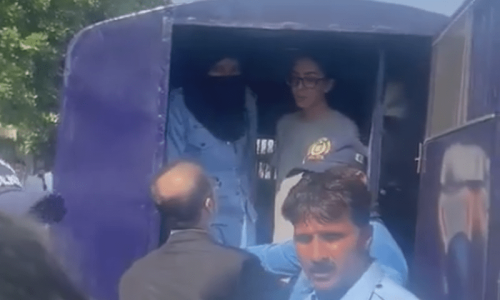Human rights lawyer Imaan Zainab Mazari-Hazir and her husband Hadi Ali were sent on Tuesday on a three-day physical remand by an Islamabad anti-terrorism court (ATC) for allegedly “creating a security risk” by removing road barriers.
The couple was arrested a day ago by the Islamabad police for “creating a security risk by interfering in state duties during an international cricket team’s visit”.
A video, shared on social media on October 25, purportedly showed Imaan and Ali moving road barriers to clear the path for traffic.
In the video, traffic constables and a man in a jacket could be seen moving the barriers back to their original positions to close the road as the lawyers made multiple attempts to remove them.
The Human Rights Commission of Pakistan (HRCP) had condemned the couple’s arrest, saying it was made on “vague charges”. The government spokesperson for legal affairs, Barrister Aqeel Malik, also strongly condemned the arrest.
While the police statement yesterday had mentioned “interference in state duties — an offence charged under Section 186 of the Pakistan Penal Code — it emerged today that a first information report (FIR) against the couple also invoked Section 7 (punishment for acts of terrorism) of the Anti-Terrorism Act.
The FIR, a copy of which is available with Dawn.com, was registered at Islamabad’s Aabpara police station on the morning of October 25, almost an hour after the time stated of the incident.
Besides the terrorism charge and section 186 of the PPC, it also invoked sections 148 (rioting, armed with deadly weapon), 149 (every member of unlawful assembly guilty of offence committed in prosecution of common object), 353 (assault or criminal force to deter public servant from discharge of his duty), and 506(ii) (criminal intimidation if threat be to cause death or grievous hurt, etc) of the PPC.
In handwriting, section 120B (punishment for criminal conspiracy) of the PPC was also added to the FIR, which was filed on the complaint of sub-inspector Tanveer Athar.
Imaan and Ali were presented before ATC judge Abual Hasnat Zulqarnain today. Imaan’s mother, former human rights minister Shireen Mazari, was also present at the court.
Lawyers Attaullah Kundi and Qaiser Imam appeared as counsels for the couple while Raja Naveed was present as the prosecutor.
The prosecution sought Imaan and Ali’s 30-day physical remand. After hearing arguments from both sides, the judge reserved the verdict. Judge Zulqarnain approved only a three-day remand, rejecting the request for 30 days’ custody.
The hearing
At the outset of the hearing, Judge Zulqarnain questioned the prosecutor about what the case was and why a 30-day remand was needed of the human rights lawyer and her husband.
“What is the case? Why are you asking for remand?” Judge Zulqarnain asked.
Prosecutor Raja Naveed explained, while reading the text of the case, that the traffic had been stopped since it was the route of the England cricket team, which was in Pakistan for a three-match Test series.
He added that the team was being provided state-level security.
According to Naveed, the suspects had tried to remove barriers erected by the police, adding that Imaan said, “I am Imaan Mazari, the road is not your father’s.”
The prosecutor alleged that traffic constable Ibrahim Khan was attacked by Ali after the former had tried to put the barriers back, adding that two or three motorcycles were successful in trespassing the blockade.
“When the local police arrived, both lawyers retreated,” prosecutor Naveed said, referring to Imaan and Ali.
Here, the judge noted that the prosecutor was only reading out the FIR’s contents, and asked what his request was.
Naveed argued that the suspects had incited the people and it was “necessary to match the video and the voice”. Upon the judge wondering if those who trespassed the barrier had not been arrested, the prosecutor responded that they were being identified.
At this point during the hearing, Kundi, the suspects’ counsel asked, “How did the police register the section for terrorism in this case?”
Addressing the judge, he said, “You oversee cases. You would know better in what sort of case a terrorism offence is invoked.”
Explaining the reason behind the couple’s actions, Kundi contended that Imaan, a lawyer herself, was in a hurry as she was due to appear in court for her client.
He alleged, “The police hit her with the barrier, the medical report for which is present.”
The lawyer argued that the case only merited the offence of obstructing state duties, adding: “The punishment should only be given for the crime that was committed”.
Here, Imam, another counsel for the suspects said: “The police are so obstinate that they are asking for a 30-day remand.”
Imam said that the man with whom the suspect had the argument was dressed in plain clothes. “Now we are giving people in plain clothes so much respect,” he said.
He reiterated that the relevant offence should be applied instead of the ATA.
The judge then asked the prosecutor why it was seeking a 30-day remand, to which Naveed replied: “We have to conduct an inquiry. They (the England Test team) were state guests. Their protection is our responsibility.
“The Sri Lankan team was attacked, policemen were martyred, Sri Lankan players were injured,” the prosecutor said, referring to the 2009 Lahore attack.
Naveed added that traffic updates had been issued and it was announced that the England team was a state guest.
Responding to the prosecutor, Imam said: “The English team must have felt very sad that the entire city had been brought to a halt because of them.”
The counsel acknowledged that both the complainant and the suspects were saying that the couple removed the barriers. “They did that but what is the liable crime?” he asked.
The prosecutor replied that the video, which was being shared on social media, was to be sent to forensics and that a photogrammetrical test was yet to be conducted as well.
Subsequently, the judge, announcing the reserved order, approved a three-day physical remand of Imaan and her husband.















































